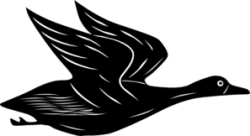Duck

Compared to other birds such as the peacock or the eagle, the duck seems like a rather unimpressive and unremarkable fowl. Appearances are often deceptive, however, and this creature has more symbolic importance than might be expected.
In China, ducks, particularly Mandarin ducks (famous for their vivid multicolored plumage) are highly auspicious creatures. Most famously, they are a symbol of martial happiness and fidelity, and this symbolism can display itself in multiple ways; duck imagery may appear on Chinese wedding invitations, it is considered good luck to have at least one duck dish served at a wedding feast, and the imagery of two ducks physically entwined is seen as a metaphor for sexual congress.
In some instances, the duck has also been ascribed powers of clairvoyance (i.e. seeing the future). Like its cousin the goose, the duck is a migratory bird whose actions and movements are strictly determined by the seasons. As such, the appearance (or absence) of ducks in certain places and/or at certain times was seen as a herald of changing circumstances. The Celts often depicted ducks paired with a solar wheel or disc to show its affinity to the cycles of the natural world.
In contrast to its prized place in Chinese culture, the duck has acquired some rather negative symbolism in the Western world. In the 13th century, Pope Gregory IX preached that ducks were the embodiment of Asmodeus, a demon that inspired lust, and it was during his reign that the foundation was laid for a papal inquisition that really brought down the hammer of religious authority on the population. Today, thankfully, much of this negativity has disappeared, and most of us know ducks simply as the playful creatures that we see and feed in parks around the world.
© Symbols.com
